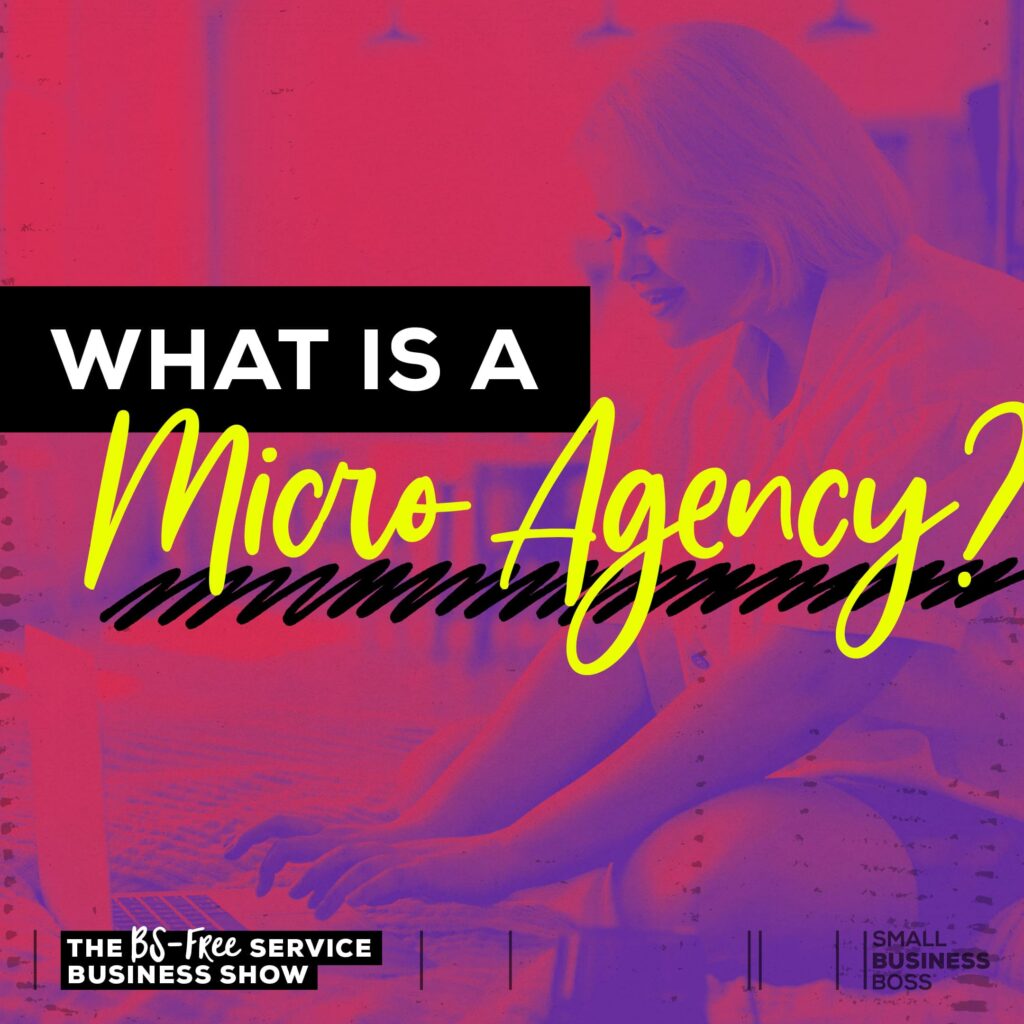
What is a Micro Agency?
Agencies are pitched as the natural next step when growing a service business, but is an agency right for you? And if you’re running an agency what do you need to consider as agencies aren’t one-size-fits-all.
In this episode, we’re looking at the world of micro agencies, including what they are, and some data that may surprise you.
Over the next few episodes, we’re going to explore what it’s really like to run an agency. You’re going to want to listen to this if you already run an agency or you’re thinking about starting an agency.
Because if there’s one thing I really encourage my clients to consider when it comes to staying solo or moving into the agency model it’s to do it on purpose. Too many people end up as accidental agency owners and have no idea what they’re really signing up for.
In this episode, we’re going to kick off the series by talking about what’s called a micro agency, and next week we’re going to dive into what you need to know.
Most Businesses are Micro Businesses
One of my biggest hesitations about going from a solo show to an agency was that while I had a lot of experience working in and with agencies, I didn’t want a business at that level. I’d had enough experiences working on bigger teams and complex million-dollar-plus accounts that I knew that’s not what I wanted.
Part of the problem was that I didn’t have an understanding of the range of options there are when it comes to running a business. In my mind, I had to be a solo business owner or have a team of 10 or 15 people.
We hear a lot about solo or freelance businesses, and then small businesses, but rarely about micro businesses.
According to the Small Business Administration in the United States, a microbusiness is “a business with 9 or fewer employees including the owner”.
This distinction is an important one as a small business is any business with up to 500 employees. The challenges and process of running a business with 300 employees are very different than three, so putting the smallest businesses in their own bucket makes perfect sense.
2019 data from the US Census found that of 8.0 million small businesses in the US, 4.3 million are microbusinesses with less than four employees. Just under 200,000 had 100 employees or more.
The reality is that the majority of businesses (in the US at least) are microbusinesses, which tells you just how viable they are as an option for solo business owners who want to grow.
What is a Micro Agency?
A micro agency is essentially a service business operating as an agency with a small team of employees and/or contractors. The exact number isn’t what matters, but rather that you’re choosing to grow and run your business with a team.
As I shared back in 2019, I believe micro agencies offer a unique opportunity for service businesses to grow in a way that blends the best parts of an agency and a lifestyle business.
The best part is that since 2020, the world of work has changed dramatically which has meant expectations of how/when companies hire or work with you are extremely different. There’s no longer the expectation that you have a physical office, a team all in one location, or any of the other trappings of a traditional agency.
The SoDA & Productive: The Global Agency Landscape 2022 report which surveyed leaders in agencies of all sizes from around the globe, gives some insight into how well agencies are performing.
Of particular note is the fact that this data is from what I consider micro agencies with 31% having less than $1 million USD in revenue, and 36% falling between $1 and $5 million per year. The report shared that in 2021, 44% of agencies reported revenue growth of 25% or more, and 51% shared that it was a banner year for their firm.
In the report’s key findings, they discuss how agencies adapted quickly to the new realities of work, and it’s not surprising when you consider that over 50% of the agencies who participated are micro agencies.
From my point of view, micro agencies have the best of both worlds. We have a proven business model, but we can evolve quickly in response to market conditions, as well as changing client needs.
Building a Micro Agency Should Be Intentional
That said, I don’t recommend that anyone jump into running an agency without careful consideration. The reality is that I’ve seen too many people fall into the agency model accidentally only ending up hating every minute of it.
While we’ll talk about this in more detail in the next episode, if you’re considering shifting to the agency model, you need to know what you’re signing up for.
And if you run an agency already, you should consider how and when you will grow. Growth should be intentional and not just something that’s happening to you, and you need to have your finger on the pulse of everything from your key agency metrics (which is everything from forecasted/realized revenue to effective billing rates to utilization rates) and with your operations such as team, tech infrastructure, knowledge management and more.
Being a micro agency doesn’t mean you don’t take these things seriously, but rather knowing what you need at each stage. In the early days of my agency, I wasn’t focused on my utilization or knowledge management, but I sure am now. Like everything, you need to build up to it over time and put the building blocks in place.
If you’re running an agency and need support, The Agency Mastermind for 2023 will be opening up soon. It’s a unique experience with a combination of 1:1 and group support for micro business owners. You can get on the wait list here.



